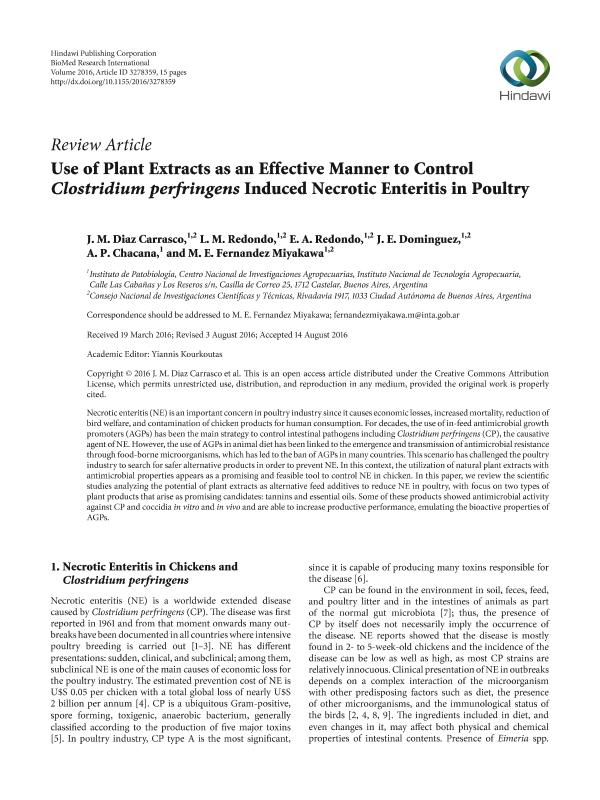Artículo
Use of Plant Extracts as an Effective Manner to Control Clostridium perfringens Induced Necrotic Enteritis in Poultry
Díaz Carrasco, Juan María ; Redondo, Leandro Martin
; Redondo, Leandro Martin ; Redondo, Enzo Alejandro
; Redondo, Enzo Alejandro ; Dominguez, Johana Elizabeth
; Dominguez, Johana Elizabeth ; Chacana, A. P; Fernandez Miyakawa, Mariano Enrique
; Chacana, A. P; Fernandez Miyakawa, Mariano Enrique
 ; Redondo, Leandro Martin
; Redondo, Leandro Martin ; Redondo, Enzo Alejandro
; Redondo, Enzo Alejandro ; Dominguez, Johana Elizabeth
; Dominguez, Johana Elizabeth ; Chacana, A. P; Fernandez Miyakawa, Mariano Enrique
; Chacana, A. P; Fernandez Miyakawa, Mariano Enrique
Fecha de publicación:
08/2016
Editorial:
Hindawi Publishing Corporation
Revista:
BioMed Research International
ISSN:
2314-6133
e-ISSN:
2314-6141
Idioma:
Inglés
Tipo de recurso:
Artículo publicado
Clasificación temática:
Resumen
Necrotic enteritis (NE) is an important concern in poultry industry since it causes economic losses, increased mortality, reduction of bird welfare, and contamination of chicken products for human consumption. For decades, the use of in-feed antimicrobial growth promoters (AGPs) has been the main strategy to control intestinal pathogens including Clostridium perfringens (CP), the causative agent of NE. However, the use of AGPs in animal diet has been linked to the emergence and transmission of antimicrobial resistance through food-borne microorganisms, which has led to the ban of AGPs in many countries. This scenario has challenged the poultry industry to search for safer alternative products in order to prevent NE. In this context, the utilization of natural plant extracts with antimicrobial properties appears as a promising and feasible tool to control NE in chicken. In this paper, we review the scientific studies analyzing the potential of plant extracts as alternative feed additives to reduce NE in poultry, with focus on two types of plant products that arise as promising candidates: tannins and essential oils. Some of these products showed antimicrobial activity against CP and coccidia in vitro and in vivo and are able to increase productive performance, emulating the bioactive properties of AGPs.
Palabras clave:
NECROTIC ENTERITIS
,
POULTRY
,
TANINNS
,
ESSENTIAL OILS
Archivos asociados
Licencia
Identificadores
Colecciones
Articulos(SEDE CENTRAL)
Articulos de SEDE CENTRAL
Articulos de SEDE CENTRAL
Citación
Díaz Carrasco, Juan María; Redondo, Leandro Martin; Redondo, Enzo Alejandro; Dominguez, Johana Elizabeth; Chacana, A. P; et al.; Use of Plant Extracts as an Effective Manner to Control Clostridium perfringens Induced Necrotic Enteritis in Poultry; Hindawi Publishing Corporation; BioMed Research International; 2016; 8-2016; 1-15
Compartir
Altmétricas



